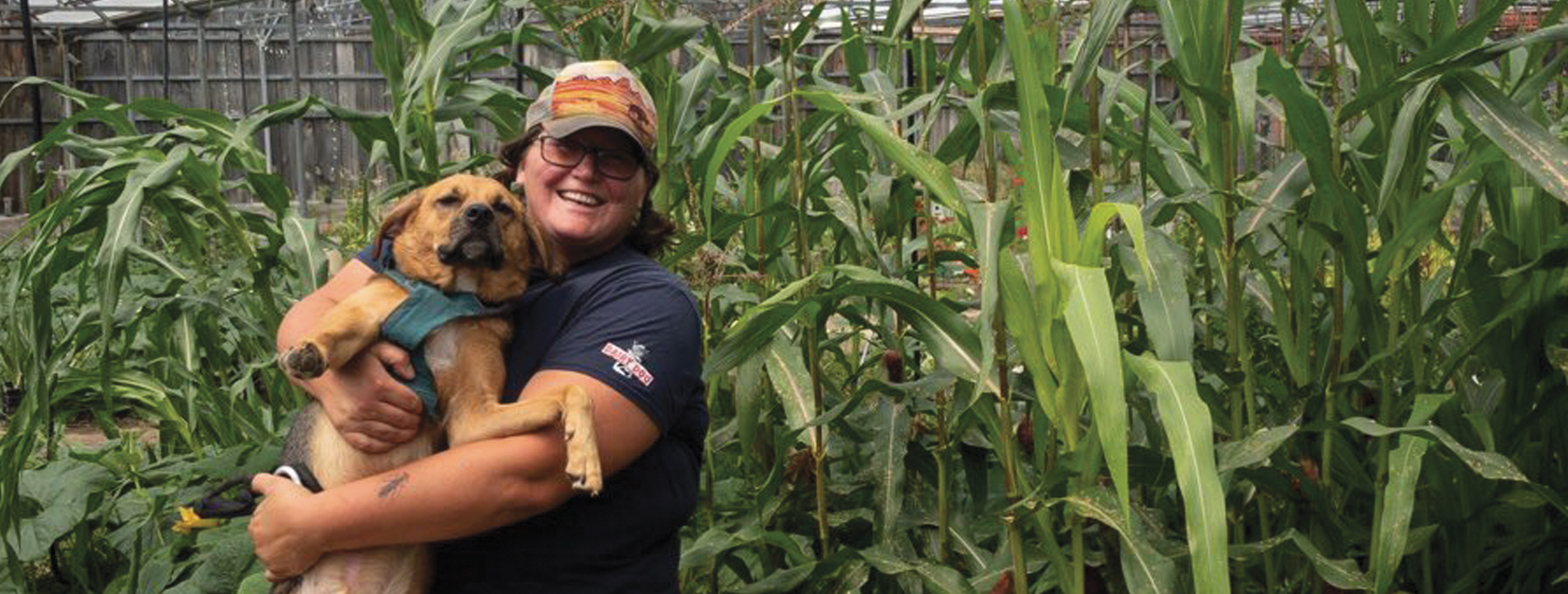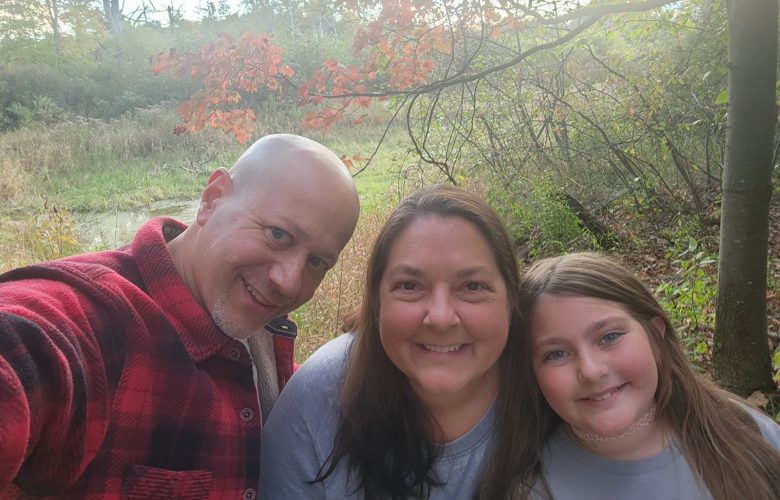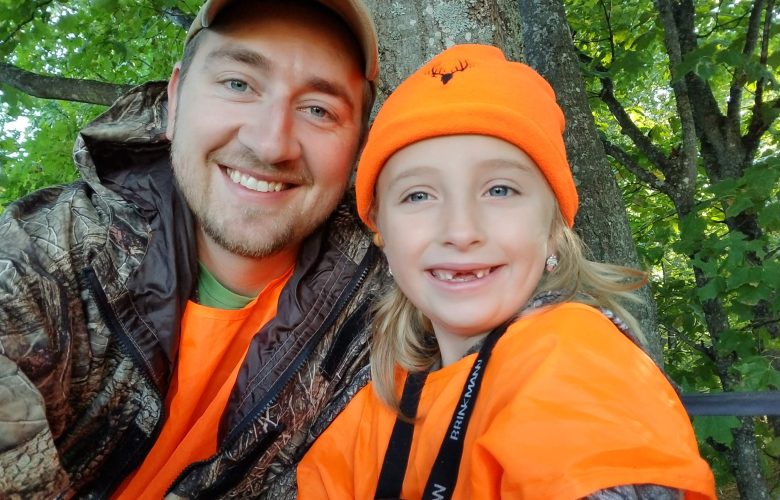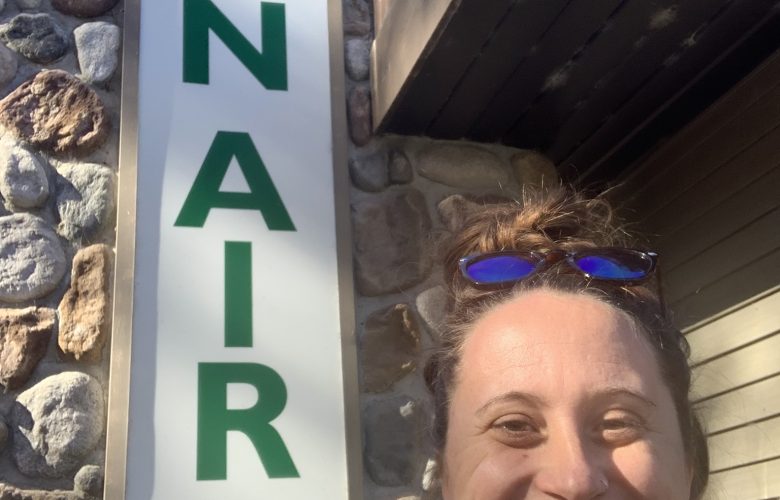New Dawn Fields produces fresh food and healing
By Greta Bolger
Current Contributor
If you encounter “Farmer Carol” at the Grow Benzie hoop house or at the farmers’ market in Elberta on Thursdays, you will find a friendly, knowledgeable, 30-something woman offering shiitake mushrooms, multiple varieties of garlic, fresh flowers, herbs, and other produce.
What you will not see right away is the deep sense of mission behind this start-up, incubator farmer—a vision to create a non-profit enterprise to heal, empower, and employ survivors of intimate partner abuse and sexual assault.
As a survivor herself, Carol Bontekoe is well aware of the long road of recovery from such abuse, and she has dedicated herself to creating a path back for others.
Now in its early stages, New Dawn Fields exists to nurture plants and people for a healthier future.
“That’s why I named it ‘New Dawn Fields,’” Bontekoe says. “A new dawn is a fresh start, and that’s what survivors need.”
World Traveler Turned Farmer
Bontekoe grew up as the fourth of five children on a dairy farm in Marion, Michigan, about 10 minutes south of McBain. She attended high school in Greenville, which is about halfway between Grand Rapids and Mt. Pleasant, and went on to Michigan State University (MSU), where she studied political science and was on the track and field team as a “thrower”—shot put, discus, and hammer.
After college, she joined the Peace Corps and went to Kyrgyzstan, in Central Asia, where she taught English and girls’ sports. From there, her stops included The Netherlands, Alaska, Chicago, and Savannah, Georgia. As a way to “reset her life” following the trauma of intimate partner violence, she spent six months hiking the Appalachian Trail from Georgia to Maine with her foxhound, Leo (trail name: “Sir Barks-a-Lot”).
In May 2018, Bontekoe made her home in Benzie County, where she has launched New Dawn Fields.
“This is a beautiful area,” Bontekoe says. “It was important for me to be in Northern Michigan. I really like the people in this area, and having so many great libraries around here sealed the deal. A job at Grow Benzie made it possible for me to move here.”
Organic Methods and Collaboration
Bontekoe began working at Grow Benzie as the groundskeeper and winter program manager just over a year ago. At the same time, she enrolled in MSU’s Organic Farmer Training Program, a seven-month program that met all day long every Monday.
“Organic produce farming is completely different than dairy farming,” she says. “I made that long commute to East Lansing every week to learn what I needed to know to farm in a healthful and sustainable way.”
In MSU’s Organic Farming Program, Bontekoe also learned the business of small-scale farming, particularly the idea of “community-supported agriculture,” commonly known as CSA.
Early in the 2019 season, she offered shares in “The Harvest Club” for $100, which entitled members to $110 worth of produce during the growing season. These funds helped with the start-up costs for this beginning farmer, including seeds, a transplanter, trellising, and soil amendments.
Throughout the growing season, Harvest Club members have been able to pick up their desired items at the Grow Benzie and Elberta farmers’ markets, as well as from the cooler at Grow Benzie, using the ”honor box” next to the cooler.
Bontekoe farms an outdoor plot at Grow Benzie, as well as growing flowers and vegetables inside the hoop house on the property. In addition, she collaborates with others to grow and harvest other foods. A collaboration with her father has produced her most successful crop to date—fresh garlic—which is grown on the family farm in Marion.
“It’s been great growing the garlic with my dad,” she says. “A lot of people feel that fresh garlic has more flavor than dried garlic, and our several varieties give cooks a lot of flavor profiles to choose from.”
The pair grows Purple Italian, Purple Glazer, Music, Siberian, Red German, and Bogatyr garlics, and Bontekoe is happy to explain the uniqueness of each variety to customers.
Keeping Farming Alive
Bontekoe also took over the Ware Farm’s shiitake mushroom harvest this year, which yielded 175 pounds of delicious mushrooms, another good seller. (For those who are unaware: the 170-acre Ware Farm is owned and operated out of Bear Lake by Sandee and Bernie Ware. It was an organic-growing favorite of many people for decades, until the couple retired recently.)
According to Bontekoe, the average family farmer today is in his or her late 50s—and farmers over 65 outnumber farmers under 35 by a ratio of six to one. This does not bode well for the local food movement. That is why she believes it is so important to support incubator farmers at a facility like Grow Benzie.
“The improvements I strive for here at Grow Benzie are not just for me,” Bontekoe says. “I’m thinking ahead to the next incubator farmer who grows here, and the one after that. It’s not easy for younger people to carve out a living in Benzie. Hopefully what we’re doing now will make the work of the next new farmer at bit easier.”
Long-Term Vision
Those who are fortunate enough to never have suffered the trauma of sexual abuse or domestic violence may not realize that “moving on” is not a short-term proposition. Though there are many organizations and resources available for victims of abuse, often their programs are not long enough or comprehensive enough to deal with the complex aftermath of abuse, which can include destroyed credit, loss of employment, lack of job skills, and nowhere to live.
In Bontekoe’s experience, survivors often need more time—like two or three years—to get back on their feet emotionally, mentally, and financially.
For these reasons, Bontekoe’s ultimate dream is to create a non-profit residential farm—including a house and at least five acres—to provide survivors with jobs, a place to live, support, and community in a collaborative, non-competitive environment.
“Even if the skills they learn don’t lead them into farming as an occupation, they will know how to grow food to feed themselves and their families,” Bontekoe says. “Doing the physically demanding and often repetitive tasks of farming can also be meditative and calming. It’s a great environment for healing.”
Bontekoe likens the residential farm of her dreams to the county ‘poor farms’ that were established based on an 1830s Michigan law which required each county to have a ‘poor house’ to provide housing, jobs, and stability to people in poverty. (Interestingly, Bontekoe’s great-grandparents ran such a farm in Sears, Michigan, in Osceola County. Also, the property where Grow Benzie is located now was once the location of Benzie County’s poor farm.)
Though Bontekoe is not in a position to hire anyone yet, she is working with a few volunteers and hopes to have a self-sustaining organization in the future. The dream is to generate enough revenue from produce sales to pay the workers and maintain the farm. Anything beyond that, in the form of donations or grants, would be used to expand and improve farming operations and housing.
Until her vision comes to full fruition, Bontekoe plans to continue farming at Grow Benzie through next summer, while she continues to seek out a permanent location for New Dawn Fields.
But her focus will remain on creating a healing environment.
“I hope to become certified in horticultural therapy,” Bontekoe says. “There is research going on now about the therapeutic value of working with plants. I know it’s been very helpful for me.”
Meet Bontekoe and learn more about New Dawn Fields by visiting the Elberta Farmers’ Market on Thursdays from 8 a.m. to 12:30 p.m. through October. Or contact her at NewDawnFields@gmail.com.
Photo Caption: “Farmer Carol” Bontekoe and her foxhound, Leo, in the hoop house at Grow Benzie. Photo by Greta Bolger.




